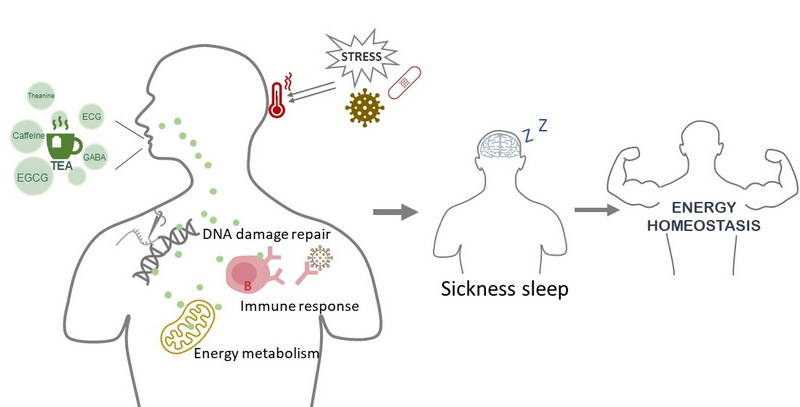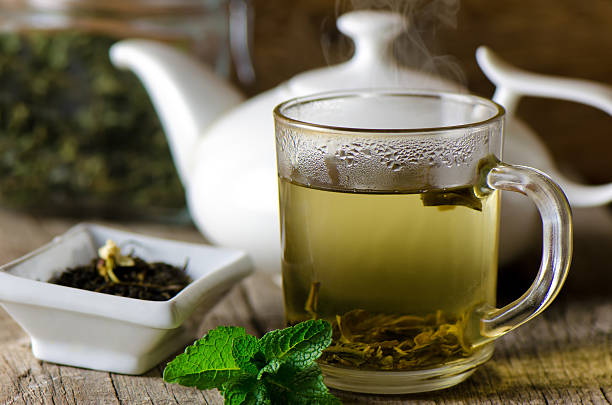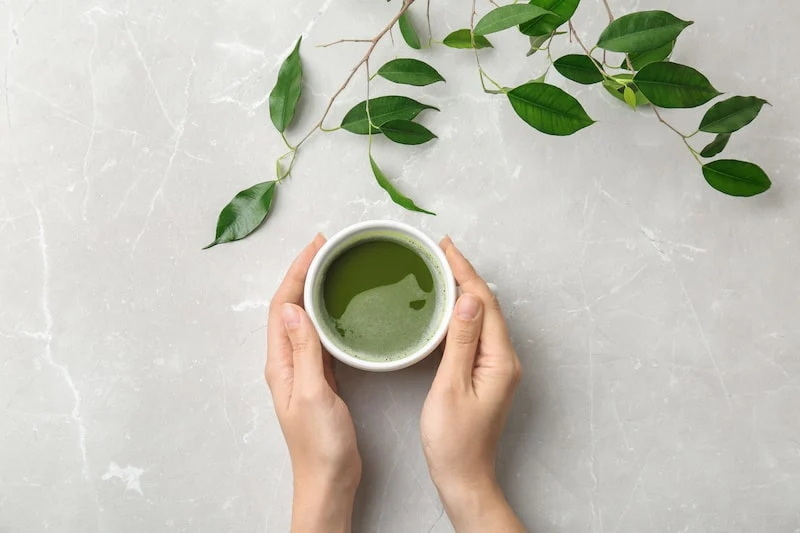Content Menu
● Introduction to Green Tea and Sleep
>> Caffeine in Green Tea
>> L-Theanine in Green Tea
● Effects of Green Tea on Sleep
>> Positive Effects
>> Negative Effects
● Studies on Green Tea and Sleep
>> L-Theanine and Sleep
>> Low-Caffeine Green Tea
● How to Consume Green Tea for Better Sleep
● Additional Tips for Better Sleep
● Conclusion
● Frequently Asked Questions
>> 1. Does Green Tea Help with Sleep?
>> 2. How Much Caffeine is in Green Tea?
>> 3. Can I Drink Green Tea Before Bed?
>> 4. What are the Benefits of L-Theanine for Sleep?
>> 5. How Can I Maximize the Sleep Benefits of Green Tea?
● Citations:
Green tea, known for its numerous health benefits, has been a subject of interest regarding its impact on sleep. The primary components of green tea include caffeine and L-theanine, which have contrasting effects on sleep quality. This article aims to explore how green tea leaf extract might influence sleep, considering both the positive and negative aspects.

Introduction to Green Tea and Sleep
Green tea is derived from the leaves of the Camellia sinensis plant and is rich in antioxidants, particularly catechins like epigallocatechin gallate (EGCG). It also contains caffeine and L-theanine, which are crucial in determining its effects on sleep.
Caffeine in Green Tea
Caffeine is a stimulant that can interfere with sleep by blocking adenosine receptors in the brain, leading to increased alertness and wakefulness. While green tea generally contains less caffeine than coffee, it still poses a risk of disrupting sleep if consumed too close to bedtime.
Caffeine Content in Green Tea:
- Average Content: 25-30 mg per 8 oz cup.
- Impact on Sleep: Can delay sleep onset and reduce sleep quality if consumed in large amounts or too close to bedtime.
L-Theanine in Green Tea
L-theanine is an amino acid found in green tea that promotes relaxation and reduces stress levels. It works by increasing the production of neurotransmitters like GABA, serotonin, and dopamine, which help in calming the mind and body.
L-Theanine Effects on Sleep:
- Relaxation: Promotes a state of relaxation, making it easier to fall asleep.
- Stress Reduction: Lowers stress levels, contributing to better sleep quality.
Effects of Green Tea on Sleep
Positive Effects
1. Stress Reduction and Relaxation: L-theanine in green tea can help reduce stress and promote relaxation, which are essential for improving sleep quality. Studies have shown that consuming low-caffeine green tea can lead to better sleep quality by reducing stress markers and fatigue.
2. Cognitive Benefits: Green tea may also improve cognitive functions, which can indirectly benefit sleep by enhancing overall mental well-being.
3. Antioxidant Properties: The high antioxidant content in green tea can help protect against oxidative stress, which is linked to sleep disorders. Reducing oxidative stress may contribute to improved sleep quality over time.
Negative Effects
1. Caffeine Interference: The caffeine in green tea can interfere with sleep, especially if consumed in large quantities or too close to bedtime. It can delay sleep onset and reduce the quality of sleep.
2. Increased Urination: Caffeine is a diuretic, which means it can increase urine production. Drinking green tea before bed might lead to more frequent nighttime awakenings to use the bathroom, further disrupting sleep.
3. Individual Sensitivity: Some individuals may be more sensitive to caffeine, experiencing heightened alertness and difficulty falling asleep even with small amounts of green tea.

Studies on Green Tea and Sleep
Several studies have investigated the effects of green tea on sleep, focusing on its components like L-theanine and caffeine.
L-Theanine and Sleep
- Balancing Caffeine Effects: L-theanine can counteract some of the stimulating effects of caffeine, potentially improving sleep quality when both are consumed together.
- Stress Reduction: L-theanine has been shown to reduce stress levels, which is beneficial for improving sleep quality.
Low-Caffeine Green Tea
- Improved Sleep Quality: Consuming low-caffeine green tea has been linked to improved sleep quality, particularly in middle-aged and elderly individuals. This is attributed to the reduced caffeine content, which minimizes sleep disruptions.
How to Consume Green Tea for Better Sleep
To maximize the sleep-promoting effects of green tea while minimizing its negative impacts:
1. Choose Low-Caffeine Options: Opt for low-caffeine green tea to reduce the risk of caffeine interfering with sleep.
2. Timing is Everything: Drink green tea during the day or early evening to allow its caffeine to be metabolized before bedtime.
3. Combine with Other Sleep Aids: Consider combining green tea with other sleep-promoting activities, such as meditation or a relaxing bath, to enhance its effects.
4. Monitor Caffeine Intake: Be mindful of overall caffeine intake from other sources to avoid excessive consumption.
5. Experiment with Decaffeination: If you're highly sensitive to caffeine, consider decaffeinated green tea options to enjoy the benefits without the risks.
Additional Tips for Better Sleep
- Create a Sleep-Conducive Environment: Ensure your bedroom is dark, quiet, and at a comfortable temperature to promote better sleep.
- Establish a Bedtime Routine: Develop a consistent bedtime routine to signal to your body that it's time to sleep.
- Limit Screen Time Before Bed: Avoid screens for at least an hour before bedtime, as the blue light can interfere with sleep.
Conclusion
Green tea leaf extract can have both positive and negative effects on sleep, depending on its caffeine and L-theanine content. While L-theanine promotes relaxation and stress reduction, caffeine can interfere with sleep quality. Consuming low-caffeine green tea during the day or early evening may help improve sleep quality by leveraging its stress-reducing properties without the negative effects of caffeine.

Frequently Asked Questions
1. Does Green Tea Help with Sleep?
Green tea can help with sleep due to its L-theanine content, which promotes relaxation and reduces stress. However, its caffeine content may interfere with sleep if consumed too close to bedtime.
2. How Much Caffeine is in Green Tea?
Green tea typically contains about 25-30 mg of caffeine per 8 oz cup, which is less than coffee but still enough to affect sleep if consumed in large quantities.
3. Can I Drink Green Tea Before Bed?
It is generally not recommended to drink green tea right before bed due to its caffeine content, which can delay sleep onset and reduce sleep quality. However, low-caffeine options might be less disruptive.
4. What are the Benefits of L-Theanine for Sleep?
L-theanine promotes relaxation, reduces stress, and helps balance the stimulating effects of caffeine, making it easier to fall asleep and improving sleep quality.
5. How Can I Maximize the Sleep Benefits of Green Tea?
To maximize the sleep benefits of green tea, consume it during the day or early evening, choose low-caffeine options, and combine it with other sleep-promoting activities.
Citations:
[1] https://www.healthline.com/nutrition/green-tea-before-bed
[2] https://www.nature.com/articles/d42473-023-00394-0
[3] https://pmc.ncbi.nlm.nih.gov/articles/PMC5537891/
[4] https://pmc.ncbi.nlm.nih.gov/articles/PMC5703787/
[5] https://www.sleepfoundation.org/sleep-aids/l-theanine-for-sleep
[6] https://journals.plos.org/plosone/article?id=10.1371%2Fjournal.pone.0309287
[7] https://pmc.ncbi.nlm.nih.gov/articles/PMC9967785/
[8] https://www.mdpi.com/2072-6643/15/4/1042






























